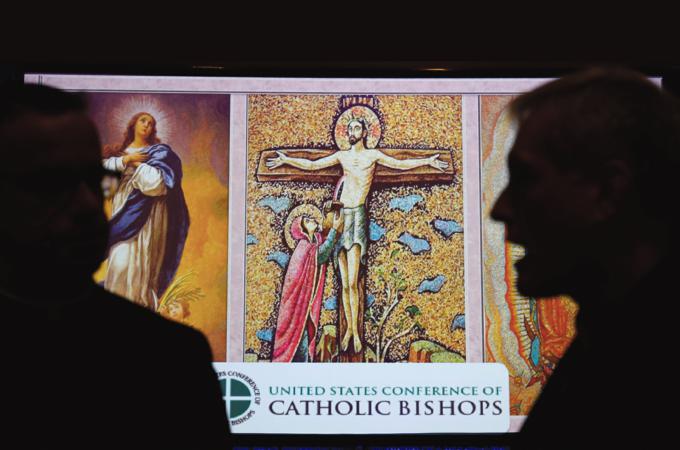Cardinal O'Malley discusses bishops' meeting
Vatican asks USCCB to delay vote on sex abuse response proposals
Survivors of clergy child sex abuse tell U.S. bishops of rejection, pain
National Review Board expects to push bishops on abuse accountability
Bishops' abuse response must trump all other issues, advisory group says
Bishops say they face angry questions over mishandling of abuse reports
Prayer and penance
BALTIMORE -- On the final day of the 2018 Fall General Assembly of the U.S. Conference of Catholic Bishops, Nov. 14, Cardinal Seán P. O'Malley spoke to the Pilot about developments at the meeting, including the unexpected request by the Vatican for bishops to delay voting on proposed responses to clergy abuse.
Following is an edited version of the interview:
Q. After the Vatican requested that no new policies be voted on at this meeting, what do you think can still be accomplished?
A. Accountability of bishops is under the authority of the Vatican and so, even if we had had a vote, it would still have to have been eventually ratified by the Vatican, and so I think they probably did not have enough time to review these proposals in the Vatican. Our bishops conference has been working on them up to the last minute but we still have the opportunity to fine-tune the documents and to vote on them in a consultative way that will allow our president, Cardinal DiNardo, when he gathers with the other presidents of bishops' conferences in February, to present what the American bishops desire, as a path forward, to assure accountability for bishops.
In the long run, hopefully, the outcome will be the same. It's just that the process will be more consultative and will also allow this discussion to be front and center in the meeting in February and therefore, hopefully, to have a global impact because in this whole area of safeguarding the United States has really led the way with the charter.
Accountability is an area that needs attention, not just in the United States, but throughout the world. So, the work that is being done here in Baltimore will make a very important contribution to the meeting of all the presidents of bishops conferences in Rome in February.
Q. Watching the proceedings, it was apparent that not every bishop has followed through with the stipulations of the 2002 charter. Are you discouraged by that?
A. I think we need to have a lot more information as to what the actual situation is, and I also think we need a much better auditing process. To me, one of the most disturbing things was the charter-mandated annual audits, but if you are not asking the right questions, you can lull yourself into a false sense of security. So, we had dioceses getting very good marks in the audits and then we discovered afterward that they had all these other defective things that had not been addressed by the audits.
I am happy that the bishops' conference is now looking at the audits and we need to use those as instruments to help bishops understand where they need to improve their safeguarding practices.
In our Commission in Rome for child protection, where our mandate is education and prevention, one of the things that the Holy Father has given us permission to do is to try to develop auditing instruments for bishops' conferences throughout the world to measure implementation of their national policies. In the States, we thought we were doing it right, but I think we need a better instrument to be able to really measure how the charter is being implemented in all its phases.
Q. Yesterday at the meeting you said that the fact that some bishops have not followed through with their own commitments affects every diocese...
A. It does, and that's why I think it is so important to have a good audit so that we are pressuring every diocese to make sure that the charter is being observed faithfully in their jurisdiction.
Q. And what should happen to those bishops that do not comply with the charter?
A. I think if a bishop is not faithful to safeguarding, he should not be a bishop.
Q. The McCarrick case has also highlighted the fact that this is not only a crisis about minors but about adults who are susceptible to abuse because of their relationship to Church leadership.
A. Even our own Commission (for the Protection of Minors) in Rome, our mandate is minors, which we define as children and vulnerable adults. Vulnerable adults in canon law are people who do not have "habitual use of reason," in other words special needs people. That area of vulnerable adults needs to be expanded to adults who, having use of reason, are still in a vulnerable situation because they are seminarians or employees in a situation where the influence of a cleric could pressure them to do something against their will. So, to begin with, we need to change that definition of vulnerable adults for our National Review Board so that they will have that as part of their responsibilities. This is something that we will be discussing in Rome for our own commission there.
Q. What would you say to those who, after hearing the news of the Vatican's intervention, are losing patience with the Church and question her ability to police herself?
A. I am very encouraged by the commitment that the bishops are demonstrating here to child protection, to strengthening the charter and to demanding accountability. I think that the work that has been done in preparation for this meeting and the meeting itself are very significant and are going to have a very positive impact going forward.



















